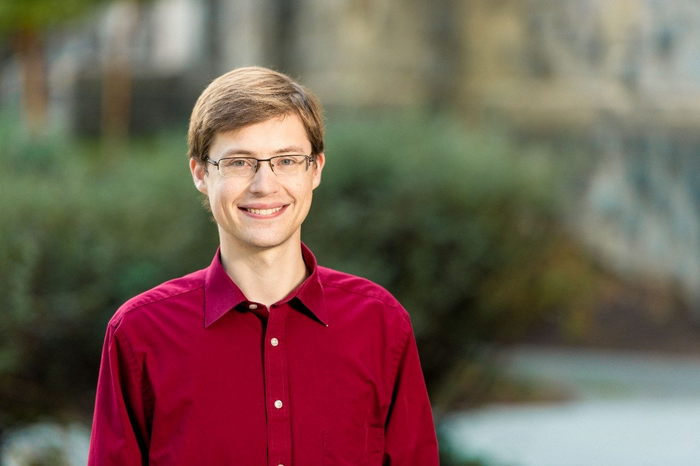Michael Schulz, assistant professor of chemistry within the Virginia Tech College of Science, has received a National Science Foundation Faculty Early Career Development (CAREER) award. The award, which begins in May, comes on the heels of Schulz receiving a U.S. Department of Energy 2022 Early Career Research Program Award.

Credit: Photo by Mike Lee for Virginia Tech.
Michael Schulz, assistant professor of chemistry within the Virginia Tech College of Science, has received a National Science Foundation Faculty Early Career Development (CAREER) award. The award, which begins in May, comes on the heels of Schulz receiving a U.S. Department of Energy 2022 Early Career Research Program Award.
Schulz received the foundation’s five-year $725,000 for the project titled “CAREER: Novel Approaches to Hyperbranched Polymers” to develop ruthenium-catalyzed self-condensing Ring-Opening Metathesis Polymerization to prepare hyperbranched polymers. The award comes from the Macromolecular, Supramolecular, and Nanochemistry program within the foundation’s Division of Chemistry.
“Hyperbranched polymers are tree-like 3D macromolecules that have very different viscosity characteristics when compared to linear polymers,” said Schulz, a faculty member with the Department of Chemistry since 2017. “As a result, hyperbranched polymers have been investigated in various applications, including additives, coatings, sensors, high loading supports in combinatorial chemistry, and homogeneous catalysts.”
In this research, inimers — small molecules acting as both initiators and monomers — will first be synthesized. Structural modifications will also be made to optimize polymerization activity. These successfully prepared inimers will then be used in self-condensing polymerization to prepare several hyperbranched polymers with interesting structural and mechanical properties.
“This research has the potential to lay the foundation for the synthesis of a new class of polymers with controlled macromolecular structures,” said Schulz, who is also an afficilated faculty member with the Macromolecules Innovation Institute.
As a part of the National Science Foundation’s support for educational outreach, Schulz will sponsor polymer-themed demonstrations to be held at the Science Museum of West Virginia. This program will focus on polymers in the modern world and how their properties depend on chemical structure. A traveling kit will also be developed for future visits to rural communities that are under-resourced in science education.
The CAREER program supports early career faculty who have the potential to serve as academic role models in research and education and to lead advances in the mission of their department or organization.
For the Department of Energy’s 2022 award, Schulz was one of 83 early career scientists from across the country were selected to receive a total of $110 million in funding over up to five years. Since its beginning in 2010, the program has given 785 awards to both university and National Lab researchers. The program’s goal is to “develop the next generation of STEM leaders who will solidify America’s role as the driver of science and innovation around the world.”
Schulz received the $750, 000 award for his project titled “Polymeric chelators for rare-earth element extraction and separation.” His lab’s research focuses on using polymer chemistry to address real-world challenges, including designing novel materials, synthesizing antiviral polymers, and developing polymers to extract critical metals from complex solutions. The department-funded project will contribute to the latter area.
“Rare-earth elements (REEs) are crucial to many modern technologies, including cell phones, electric vehicles, hard drives, flat screen displays, and many more,” Schulz said. “As global demand for these metals outpaces supply, new and sustainable sources are needed, as well as more efficient extraction and purification methods.”
Rare-earth elements are often found mixed together because they are chemically similar. Consequently, separating these mixtures is a significant challenge. Metal-binding polymers have great potential in these difficult separations due to their relatively low cost and high affinity for target elements.
“In my lab, we are developing materials (metal-binding polymers) that can address this challenge. Our research focuses on studying and ultimately controlling the interaction between polymers and rare-earth elements to improve extraction and purification processes.”
In these processes, the metal-chelating polymer binds to a target element, forming a larger complex that is much easier to separate. By investigating the myriad factors that affect this polymer–metal interaction, Schulz and his group hope to uncover general design principles that can be used to create materials with predictable and controllable metal-binding properties. Such materials could lead to more effective extraction and separations processes, ultimately ensuring that the rare-earth elements essential to modern life remain available.
“Science is a team effort, and I’ve been fortunate to work with phenomenal students. On this project, my Ph.D. student, Ryan Archer, deserves special recognition, as he pioneered many of our synthetic and analytical approaches. He has graduated now, but his contributions to the project were immense, and his work has laid a solid foundation for our future research in this area.”




